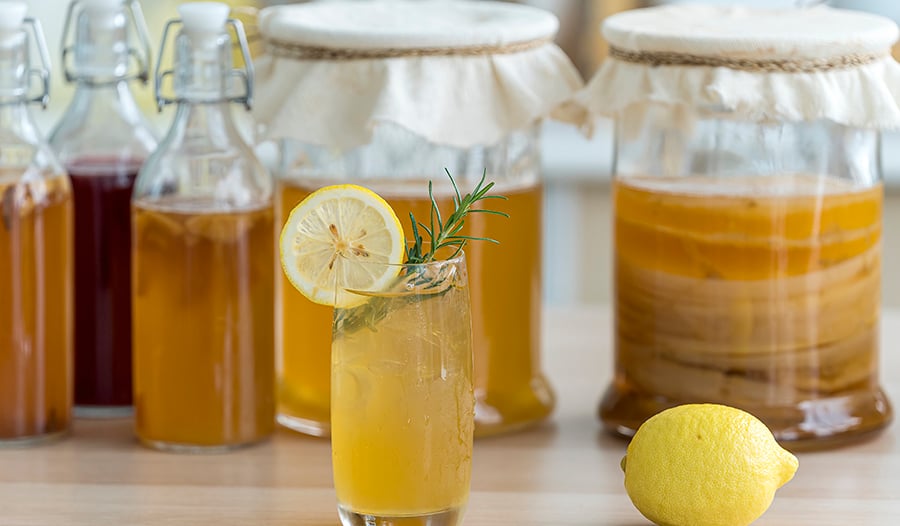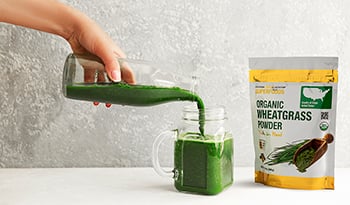What Are The Health Benefits Of Kombucha?

What Is Kombucha?
Kombucha is a fermented tea beverage that offers numerous health benefits and has gained popularity over the years. Fermentation occurs when microorganisms like yeast and bacteria break sugars down into other simpler substances. This process is used to create foods and beverages like beer, wine, bread, kimchi, yogurt, and, of course, kombucha.
You can purchase it by the bottle in countless flavors at most grocery stores or make your own at home. Beyond its delightfully tangy taste, kombucha offers health benefits and is a good source of probiotics and antioxidants.
Kombucha is made with a symbiotic culture of bacteria and yeast (SCOBY) that is often referred to as the “mother,” similar to the “mother” found in vinegar. The SCOBY is added to brewed black or green tea along with sugar, fermentation takes place, and voila—kombucha tea is made! While homemade kombucha traditionally isn’t carbonated, many store-bought brands add carbonation for a fizzy soda pop-like experience.
Kombucha’s History
Kombucha originated around 200 B.C. in Northeast China and was originally consumed for its healing properties. Kombucha gained popularity and spread to Russia and other parts of Eastern Europe and Germany before making its way to the United States in the early 21st century. Today you can find kombucha in almost any grocery store!
5 Evidence-Based Health Benefits of Kombucha
Kombucha’s health benefits are largely due to fermentation, which produces a probiotic-rich beverage. Kombucha’s health benefits also stem from it being a tea-based beverage. While kombucha can be made with any caffeinated tea, including white, black, oolong, or green, research suggests kombucha made from green tea offers the most benefits.
Below are the evidence-based health benefits of drinking kombucha.
1. Kombucha contains probiotics for gut health
Like many fermented foods kombucha is a good source of probiotics.1 While it shares probiotic benefits with yogurt and kefir, kombucha uniquely combines these beneficial bacteria with the antioxidants found in tea. Probiotics are bacteria and yeasts that offer health benefits when consumed. Consuming foods naturally rich in probiotics, such as kombucha, kimchi, sauerkraut, and sourdough, can support microbial diversity within your gut and overall gut health. Gut health matters because gut health impacts immune health—in fact, 70 to 80% of immune cells reside in the gut.2 A healthy gut also supports bowel regularity, digestion, cognitive function, and immune health.
2. Kombucha provides antioxidants similar to green tea
Kombucha made with green tea is rich in antioxidant compounds known as polyphenols, which are abundant in green tea. Drinking green tea may help reduce the risk of chronic disease.3, 4, 5 Regular consumption of green tea may also support cognitive function, help manage blood sugar levels, and help burn fat.6, 7
3. Kombucha may support heart health
Heart disease is the world's leading cause of death, making kombucha's potential cardiovascular benefits particularly noteworthy. Green tea drinks like kombucha have been shown to help lower the risk of heart disease.8 Researchers believe this may be due to the antioxidant compounds found in green tea.
4. Kombucha may support better blood sugar levels
Green tea has also been shown to have a beneficial effect on blood sugar levels.9 However, since some kombuchas may be high in sugar, check the nutrition label and choose a kombucha with no sugar added after fermentation.
5. Kombucha supports metabolic function
Green tea contains epigallocatechin-3-gallate, also known as EGCG. EGCG acts as a powerful antioxidant that fights free radical damage. EGCG also has anti-inflammatory properties and may help to suppress the action of pro-inflammatory chemicals within the body.10
Kombucha Side Effects
Kombucha has become popular as a healthier beverage option. While Kombucha may be more nutritious than high-sugar sodas, it does contain caffeine, sugar, and limited amounts of alcohol as a result of fermentation. Keep these cautions in mind and consume kombucha in moderation.
High in Added Sugar
Depending on the brand, some store-bought kombuchas may be high in added sugar. Always read the ingredient list and nutrition facts panel to choose a kombucha with little added sugar.
Mold and Bad Bacteria
Proper fermentation and cleanliness are essential for avoiding harmful bacterial growth, particularly in homemade kombucha. Sanitize all glassware properly, wash your hands frequently, and sterilize your workspace to reduce the risk of mold or other harmful bacteria growth. When properly prepared with good sanitation practices, homemade kombucha can be just as safe as store-bought varieties while offering the benefits of customization and freshness.
Alcohol Content
Kombucha naturally contains alcohol as a byproduct of fermentation, raising questions about kombucha alcohol content. Most store-bought kombucha contains .5% or less alcohol, so it can be sold as a non-alcoholic beverage. For reference, traditional beer contains approximately 4.5% alcohol.
Always check the ingredient label for alcohol content to know exactly how much is in the kombucha you are drinking. And keep in mind that some brands purposely make a higher alcohol level kombucha as an alternative to beer.
Homemade kombucha contains a small amount of alcohol as well—typically between 1% to 2.5% alcohol content.
Carbonation
Those with IBS or other digestive symptoms may want to limit kombucha consumption since added fruit juice and carbonation can exacerbate digestive issues like gas and bloating in some people.
Ingredients To Make Kombucha
- SCOBY: The symbiotic culture of bacteria and yeast has an orange-yellow jelly-like consistency. If you have a friend who makes kombucha, peel a layer known as a “baby” from their SCOBY “mother.” You can also purchase a SCOBY from a health food store, online, or even make one at home from scratch.
- Filtered Water: Filtered water or spring water works best. Avoid tap water when possible.
- Sugar: Cane sugar, turbinado, or brown sugar work best. Avoid artificial sweeteners, maple syrup, honey, or agave.
- Caffeinated Tea: Black tea, white tea, or green tea work best. Avoid herbal teas or tea with essential oils, which may interfere with the fermentation process and lead to bacteria or mold growth.
- Prepared Kombucha: Unflavored store-bought or homemade kombucha can be used as a starter for your own kombucha. Avoid flavored kombucha, which may introduce bad bacteria and increase the risk of mold growth.
You can also look for starter kits online or kombucha powders if you’d rather not make your own kombucha at home!
Homemade Kombucha Tips
- Use glass containers: Metal can interact with the acidity in kombucha and harm your SCOBY. Plastic can be porous and introduce harmful bacteria.
- Temperature matters: Fermentation thrives in warmer weather. If your home is chilly or it’s a cold season, fermentation may still occur but at a slower pace.
- Avoid mold: If you see green, white, or black spots growing on your SCOBY, toss the whole batch.
- Keep it clean: One of the best ways to reduce the risk of mold growth is to keep all supplies and workspaces clean!
Easy Homemade Kombucha Recipe
This recipe makes one gallon or 32 half-cup servings:
Ingredients:
- 1 SCOBY
- 3 ½ quarts of filtered water
- 1 cup of cane sugar
- 8 caffeinated tea bags (green, white, or black tea all work)
- 2 cups of unflavored kombucha, store-bought or homemade
Directions:
- Bring 1 quart of water to a boil.
- Stir in sugar and let it dissolve.
- Add tea bags and let steep for 10 minutes.
- In a clean one-gallon jar, combine 1 quart of sugar-tea mix with the remaining 2 ½ quarts of filtered water along with the SCOBY.
- Cover the jar lid with a cloth and rubber band to allow airflow but prevent bugs or bacteria from getting in.
- Place in a cupboard or somewhere out of direct sunlight.
- The ideal temperature for kombucha fermentation is between 70 to 75 degrees Fahrenheit.
- Let the kombucha ferment on a counter or in a cabinet out of direct sunlight for 7 to 14 days. On day seven, start tasting the tea by pouring a small sample into a glass. It will taste sweet at first, but the longer it ferments, the more tart your kombucha will taste with a classic vinegar kombucha flavor profile.
- When you’ve achieved the flavor you like, pour the kombucha into jars and refrigerate.
- With clean hands, place the SCOBY in a new clean jar and pour over with some of the recently made Kombucha. Keep stored in a cupboard or out of direct sunlight and use it for your next batch.
How To Naturally Flavor Kombucha
Once kombucha has fermented and the SCOBY is safely removed, you can add fresh juice to naturally add flavor. Blueberry juice, tart cherry juice, pomegranate juice, ginger juice, orange juice, and other juices are all delicious additions that make for tasty kombucha!
Frequently Asked Questions About Kombucha Benefits
Is it OK to drink kombucha every day?
Yes, for most people, a small daily serving of 4-8 ounces is generally safe. Moderation is key due to the sugar and trace alcohol content, so always listen to your body.
Who should not drink kombucha?
Pregnant or breastfeeding women, people with compromised immune systems, and those with severe kidney or liver disease should avoid it or consult a doctor due to the live cultures.
How much kombucha should you drink for health benefits?
There is no official dosage, but a common guideline is 4-8 ounces daily. If you are new to kombucha, start with an even smaller amount to see how your body responds.
Can kombucha help with weight loss?
It's not a magic solution, but it can support weight loss. It serves as a low-calorie alternative to sugary drinks and its probiotics can support a healthy gut, which plays a role in metabolism.
Does kombucha have benefits for sexual health?
There are no direct, proven benefits. However, by supporting gut health and overall energy, kombucha contributes to the general wellness that is foundational for a healthy libido.
Are there specific kombucha benefits for women?
The probiotics in kombucha support a healthy gut and vaginal microbiome. This may help women maintain a balanced vaginal pH and reduce the risk of common infections like yeast infections or BV.
Why Drink Kombucha
Kombucha is a good source of probiotics and, when made with green tea, provides antioxidants like polyphenols that support cognitive function, help manage blood sugar, and support heart health. The EGCGs found in green tea also have anti-inflammatory properties. You can buy kombucha at most grocery stores, make your own at home, or enjoy a powder version mixed with water!
If you’re considering adding kombucha to your wellness routine for its health benefits, talk with a Registered Dietitian Nutritionist who can review your health history, dietary intake, and provide individualized dietary feedback.
References:
- Chakravorty S, Bhattacharya S, Chatzinotas A, Chakraborty W, Bhattacharya D, Gachhui R. Kombucha tea fermentation: Microbial and biochemical dynamics. Int J Food Microbiol. 2016;220:63-72.
- Wiertsema SP, van Bergenhenegouwen J, Garssen J, Knippels LMJ. The Interplay between the Gut Microbiome and the Immune System in the Context of Infectious Diseases throughout Life and the Role of Nutrition in Optimizing Treatment Strategies. Nutrients. 2021 Mar 9;13(3):886.
- Kurahashi N, Sasazuki S, Iwasaki M, Inoue M, Tsugane S; JPHC Study Group. Green tea consumption and prostate cancer risk in Japanese men: a prospective study. Am J Epidemiol. 2008;167(1):71-77.
- Sun CL, Yuan JM, Koh WP, Yu MC. Green tea, black tea and breast cancer risk: a meta-analysis of epidemiological studies. Carcinogenesis. 2006;27(7):1310-1315.
- Yang G, Shu XO, Li H, et al. Prospective cohort study of green tea consumption and colorectal cancer risk in women. Cancer Epidemiol Biomarkers Prev. 2007;16(6):1219-1223.
- Liu K, Zhou R, Wang B, et al. Effect of green tea on glucose control and insulin sensitivity: a meta-analysis of 17 randomized controlled trials. Am J Clin Nutr. 2013;98(2):340-348.
- Nagao T, Hase T, Tokimitsu I. A green tea extract high in catechins reduces body fat and cardiovascular risks in humans. Obesity (Silver Spring). 2007;15(6):1473-1483.
- Kuriyama S. The relation between green tea consumption and cardiovascular disease as evidenced by epidemiological studies. J Nutr. 2008;138(8):1548S-1553S.
- Liu K, Zhou R, Wang B, et al. Effect of green tea on glucose control and insulin sensitivity: a meta-analysis of 17 randomized controlled trials. Am J Clin Nutr. 2013;98(2):340-348.
- Ohishi T, Goto S, Monira P, Isemura M, Nakamura Y. Anti-inflammatory Action of Green Tea. Antiinflamm Antiallergy Agents Med Chem. 2016;15(2):74-90.
DISCLAIMER:This Wellness Hub does not intend to provide diagnosis...
















































































 Table of Contents
Table of Contents
















